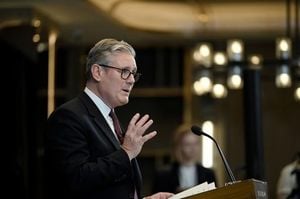In a remarkable turn of events, astronauts Sunita "Suni" Williams and Barry "Butch" Wilmore have returned to Earth after an extended stay of 286 days aboard the International Space Station (ISS), a duration that eclipsed their original eight-day mission. This protracted stay was not due to mere exploration but rather a series of technical delays primarily attributed to issues with Boeing's Starliner capsule, that left them orbiting much longer than planned.
President Donald Trump spoke out on the matter, announcing that he supports providing overtime pay to the astronauts, which has caused a stir given that NASA's policy typically excludes such additional compensation for extended missions. During a press briefing on March 21, 2025, Trump expressed his willingness to personally cover the extra costs if needed, stating emphatically, "If I have to, I’ll pay out of my own pocket. It’s not much for what they have been through." His comments come after lengthy discussions surrounding the astronauts' compensation due to their unprecedented time in space.
Nasa’s regulations normally allow for astronauts like Williams and Wilmore to receive only a daily allowance of $5 for unforeseen expenses, amounting to approximately $1430 for their stay. Their base salary stands at around $152,000 per year.
After departing for space in June 2024, the astronauts were initially tasked with an eight-day mission aboard the Starliner, a pivotal project for Boeing intended to transport crew to the ISS. However, problems soon arose when they faced a propulsion system failure characterized by a helium leak and engine issues, which led to a cascade of delays. Ultimately, they returned to Earth on March 18, 2025, with their dedication and resilience being celebrated by peers and officials alike.
Moreover, as the situation unfolded, Elon Musk, the founder of SpaceX, chimed in, claiming he had offered assistance to facilitate the astronauts' early return. However, both NASA and the astronauts refuted this assertion, further complicating the narrative surrounding the mission's challenges.
NASA confirmed that during the extended stay, the astronauts received their routine paycheck based on a 40-hour workweek and that no additional compensation is generally provided for overtime or holiday work, which raised eyebrows about fairness in their treatment. In light of Trump’s statements, the ongoing discussions about astronaut pay may spark broader conversations about how we value the work done in such precarious environments.
As Trump veered the discussion towards the administrative measures taken during the Biden administration, he highlighted what he describes as a failure to adequately support the astronauts during their prolonged mission. Commenting on this, the former president said, "Nobody told me about this. I’ll make sure they’re taken care of. They deserve it for their bravery."
This incident has not just shed light on the astronauts’ predicament but also raised critical questions about the policies governing compensation for space missions. With America being at the forefront of space exploration, this event underscores the need for possibly reevaluating how astronauts are compensated, especially during extraordinary circumstances.
In the meantime, as Williams and Wilmore settle back into life on Earth, their experience in space highlights the ongoing sacrifices made by those who venture into the unknown. As discussions continue on the matter, they stand as testaments to the human spirit’s capacity for endurance and exploration.
Ultimately, the focus not only lies on their extraordinary journey but also on the structural changes that may come as a result of it. As Trump stands by his words of financial support, many will be watching closely to see if policy changes arise out of this significant event.





